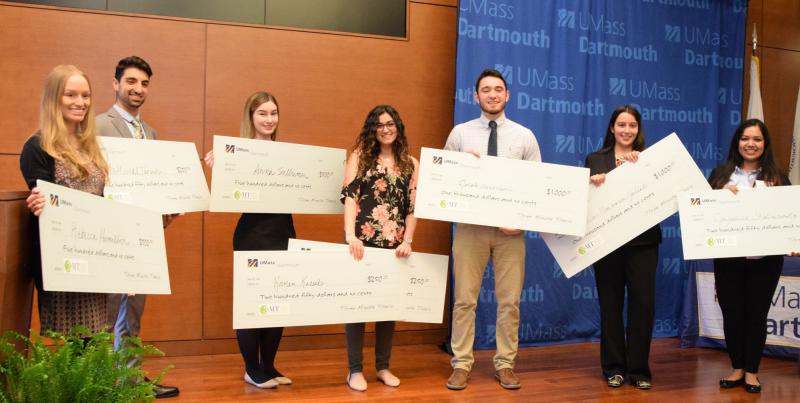UMass Dartmouth student researchers tackling diabetes, dolphin mysteries
While on a research trip in Florida, Rebecca Hamilton noticed something strange about a group of bottlenose dolphins.
The University of Massachusetts Dartmouth graduate student watched as time and time again, one dolphin startled a passing school of mullet, while another dolphin blocked the fish’s escape -- leading to feeding time for the rest of the group.
"Trapped, mullets choose to jump vertically out of the water, where they then fall into the open waiting mouths of the dolphins," Hamilton explained.
Already recognized as the first recorded instance of role specialization in marine mammals, Hamilton will return to Florida over the summer with high-tech sound equipment to test another theory: are the dolphins coordinating cooperatively for a common goal?
“Is this behavior truly cooperative, or could it be that the driver dolphin does all the hard work, and the barrier dolphins just show up as uninvited dinner guests to score an easy meal,” Hamilton said.
Hamilton explained all of this to a crowd of students, faculty, and the general public at the university’s Three Minute Thesis competition on April 19. Inspired by a program developed by the University of Queensland, students had 180 seconds to break down their complex research projects in layman’s terms using only their voice and a single static PowerPoint slide.
Hamilton’s presentation earned her a second-place finish in the graduate student category and a $500 check.
Jacob Aaronson took the $1,000 top prize in the undergraduate category for research to better understand and prevent the risk of bone fractures caused by type 2 diabetes.
By incubating bone samples from human cadavers in a high-sugar environment, it caused the collagen network within the bone to stiffen and become more prone to fracture. He's now looking at drugs to reduce the risk.
“Type 2 diabetes is growing at a really undesirable rate right now,” Aaronson said. “It’s an epidemic in America.”
In the graduate category, Erika Naumann Gaillat earned the $1,000 top prize for her thesis pitch of exploring a novel way to power increasingly popular wearable medical technology, from Fitbits to advanced biosensor monitoring equipment.
“We need a new power source that is not only easy to wear and more lightweight and less cumbersome for our aging population, but it needs to be self-sustainable,” Gaillat said.
Her idea is to harness triboelectricity, which is generated by two objects rubbing against each other. She created special materials to generate enough voltage to power wearable devices. The technology could be inserted into shoes and clothing, using human movement to create power.
English undergrad Elizabeth O’Donnell presented her project, which explores the use of humor as a means to tackle social and political controversies.
Raised in an Irish-American Catholic family, O’Donnell’s research relies on Father Ted, an Irish sitcom known for exploring controversial subjects like Ireland's Catholic Church sex abuse scandal.
“They make the unspeakable, speakable,” O’Donnell said. “Because of this tactic of humor, the Irish were to not only discuss and confront polarizing topics, but they were able to move past and move on from the trauma of the church scandals.”
A total of 20 graduate students and 12 undergraduate students participated in the competition, with six each moving to the final round. Students were judged by a panel of professors on areas including comprehension and content and engagement and communication.













